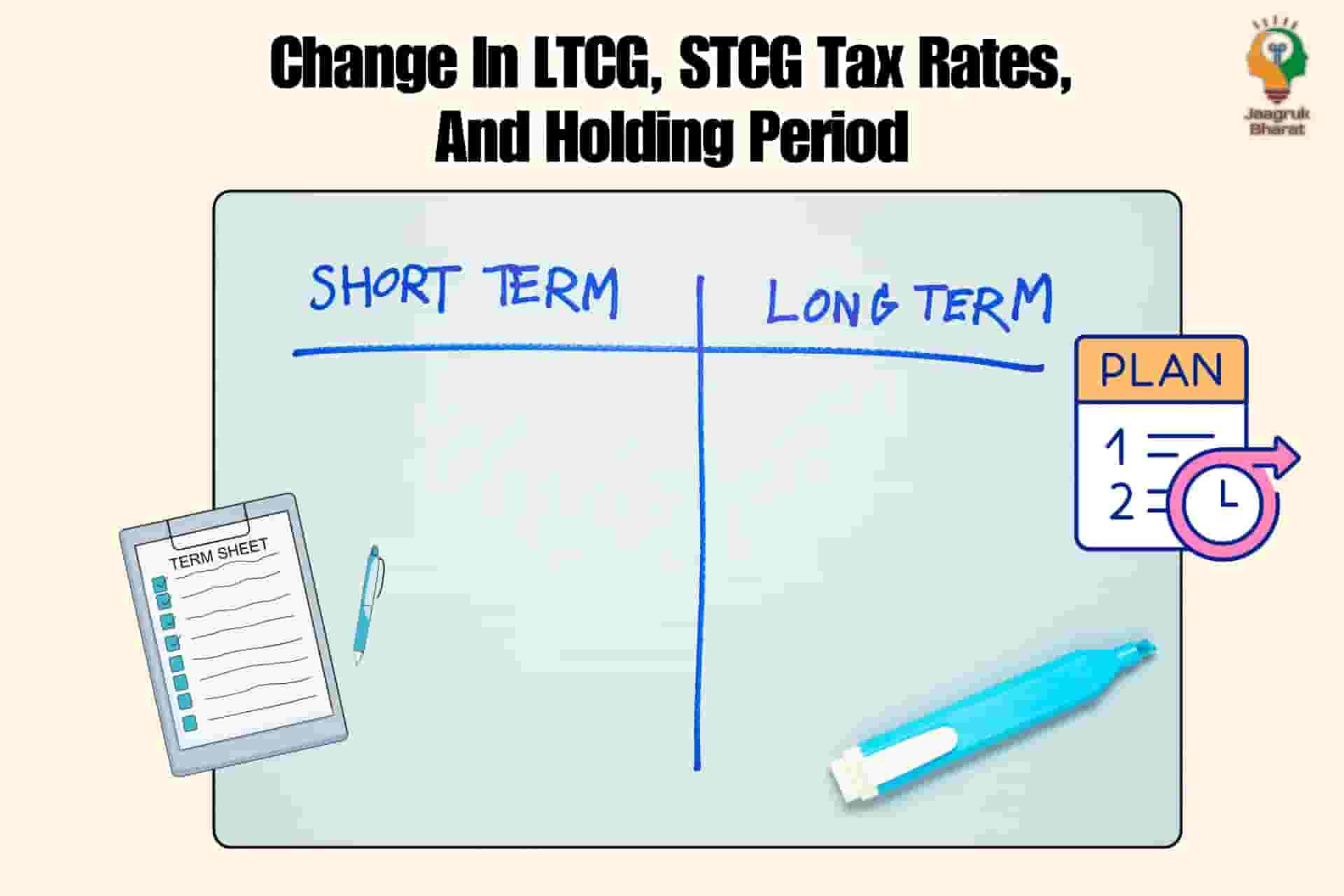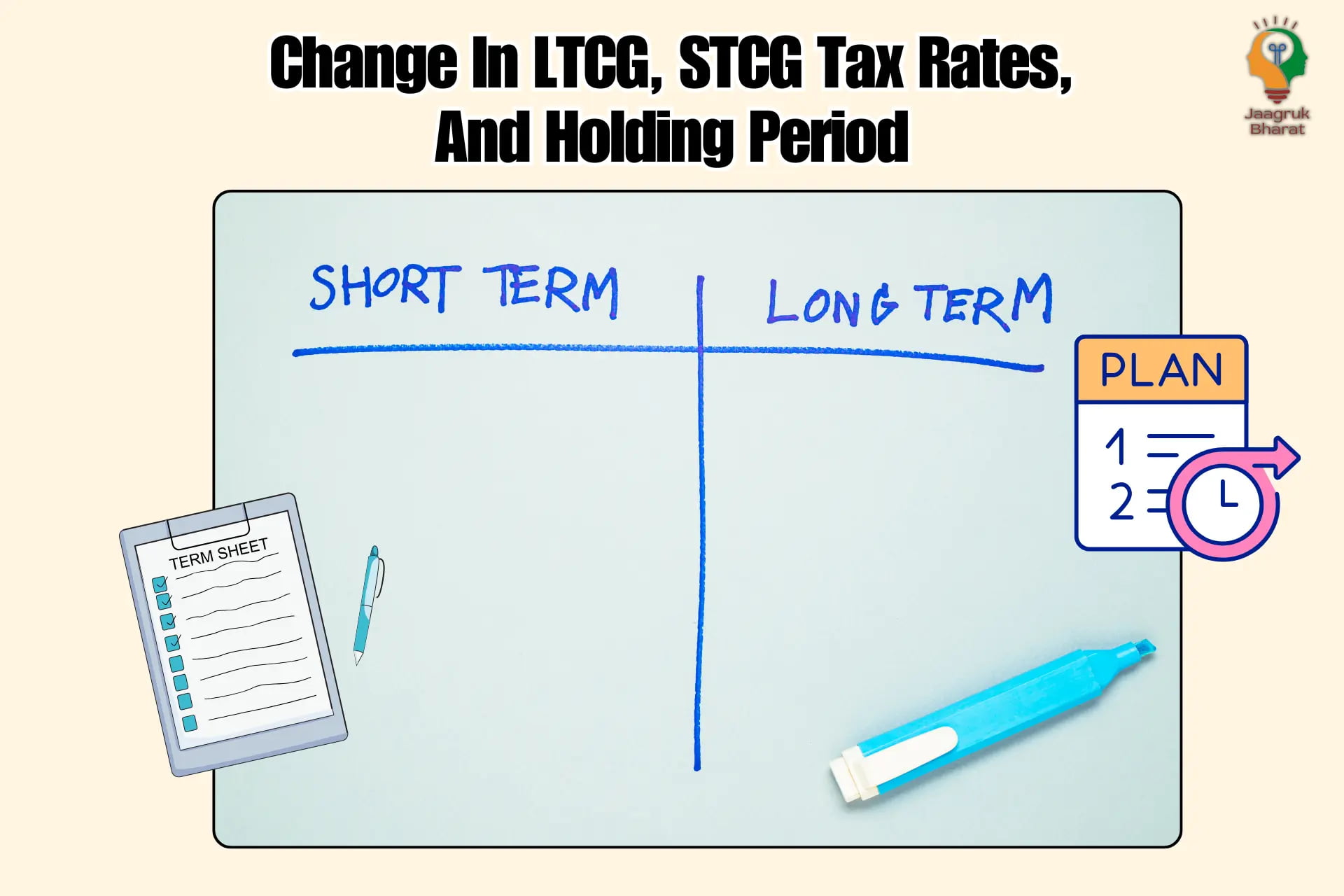Budget 2024: Everything You Need To Know About The Change In LTCG, STCG Tax Rates, And Holding Period
Updated: 12-10-2025 at 11:53 PM
1k


The Union Budget 2024 introduced significant changes to almost all the sectors in the country. While employment, energy and several other sectors received huge allocations, the government has also promoted ease of doing business by slashing and abolishing customs duty rates on specific goods.
Similarly, the budget 2024 also introduced a change in the treatment of capital gains and their taxation under the Income Tax Act. The holding periods of both long-term and short-term capital gains have been revised. The government has also issued clarifications and details about these changes.
Let us have a look at the revisions made by the Union Budget 2024!
Change In Holding Periods
The Budget 2024 proposed to simplify the holding period process by keeping only two holding periods for the treatment of short-term capital gains (STCG) and long-term capital gains (LTCG).
The capital gains are classified based on their holding period into short-term and long-term. In the previous scenario, before Budget 2024, listed equity shares and gains from them were treated as long-term if they were held for more than 12 months. On the other hand, gains from unlisted bonds were dealt with as long-term if a person held them for more than 36 months.
The FM, Nirmala Sitharaman while presenting Union Budget 2024 announced that there will be two holding periods from now on — 12 months and 24 months to ascertain the nature of capital gains and ascertain they as short-term or long-term.
Gains arising from listed assets will be treated as LTCG if they are held for more than 12 months. Listed assets are those that are recognised and duly listed by recognised stock exchanges of the country. The following listed assets will be counted for this purpose:
-
Listed stocks,
-
Listed bonds,
-
Equity ETFs,
-
Gold ETFs,
-
Bond ETFs,
-
Real estate investment trusts (REITs), and
-
Infrastructure investment trusts (InvITs).
For assets apart from these, the holding period would be 24 months to segregate them as long-term or short-term capital gains. The following assets will be included in this:
-
real estate,
-
gold,
-
unlisted shares (shares listed abroad will also be considered unlisted),
-
gold mutual funds,
-
debt mutual fund units bought on or before March 31, 2023, and
-
foreign equity funds.
The exemption on capital gains from listed equity and equity-oriented mutual funds has also been increased from Rs. 1 lakh to Rs. 1.25 lakh.
Taxation Of Capital Gains
Previously, short-term capital gains and long-term capital gains were treated differently from one another. However, Union Budget 2024 has eliminated the differential treatment. The gains will now be taxed at the income tax slab that the holder comes under. This however does not apply to listed equity shares and equity mutual funds.
Union Budget 2024 has also introduced a hike in the treatment of short-term capital gains from equity shares and equity mutual funds to 20%. This provision will apply irrespective of the tax slab of the taxpayer. Long-term capital gains will be taxed at a standard rate of 12.5% without indexation. This rate earlier was 10% for STT-paid listed equity shares, units of equity-oriented fund, and business trusts under Section 112A. For other assets, it was 20% with indexation under Section 112 of the Income Tax Act.
These changes will be effective immediately from July 23, 2024, the date on which Union Budget 2024 was tabled.
Property Sales To be Expensive Now!
The rate for other long-term capital gains on all assets (like sale of house property) has been reduced from 20% to 12.5% and the benefit of indexation has been removed. Before the budget 2024, they were taxed at 20% with the incentive of indexation.
This has been done to simplify the taxation of capital gains and their computation.
Conclusion
The changes have been brought in the treatment of capital gains to keep up with the pace of our dynamic economy. Budget 2024 is predicted to bring in some level of inflation, however, it has also given major employment and capital flow boosting schemes. You can read about these schemes in our article titled, ‘Union Budget 2024: Three Major Schemes To Boost Employment, Skilling And Education’.
For more information and updates stay tuned to Jaagruk Bharat on our website and social media handles.
Frequently Asked Questions
0
0
1k
0
0
1k Views
0
No comments available





Our Company
Home
About
T&C
Privacy Policy
Eula
Disclaimer Policy
Code of Ethics
Contact Us
Careers
Cancellation & Refund Policy
Categories
Women
Insurance
Finance
Tax
Travel
Transport & Infrastructure
Food
Entertainment
Communication
Government ID Cards
E-commerce
Traffic guidelines
Miscellaneous
Housing and Sanitation
Sports
Startup
Environment and Safety
Education
Agriculture
Social cause
Employment
Disclaimer: Jaagruk Bharat is a private organization offering support for documentation and government scheme access. We are not affiliated with any government body. Official services are available on respective government portals. Our goal is to make processes easier and more accessible for citizens.
All Copyrights are reserved by Jaagruk Bharat